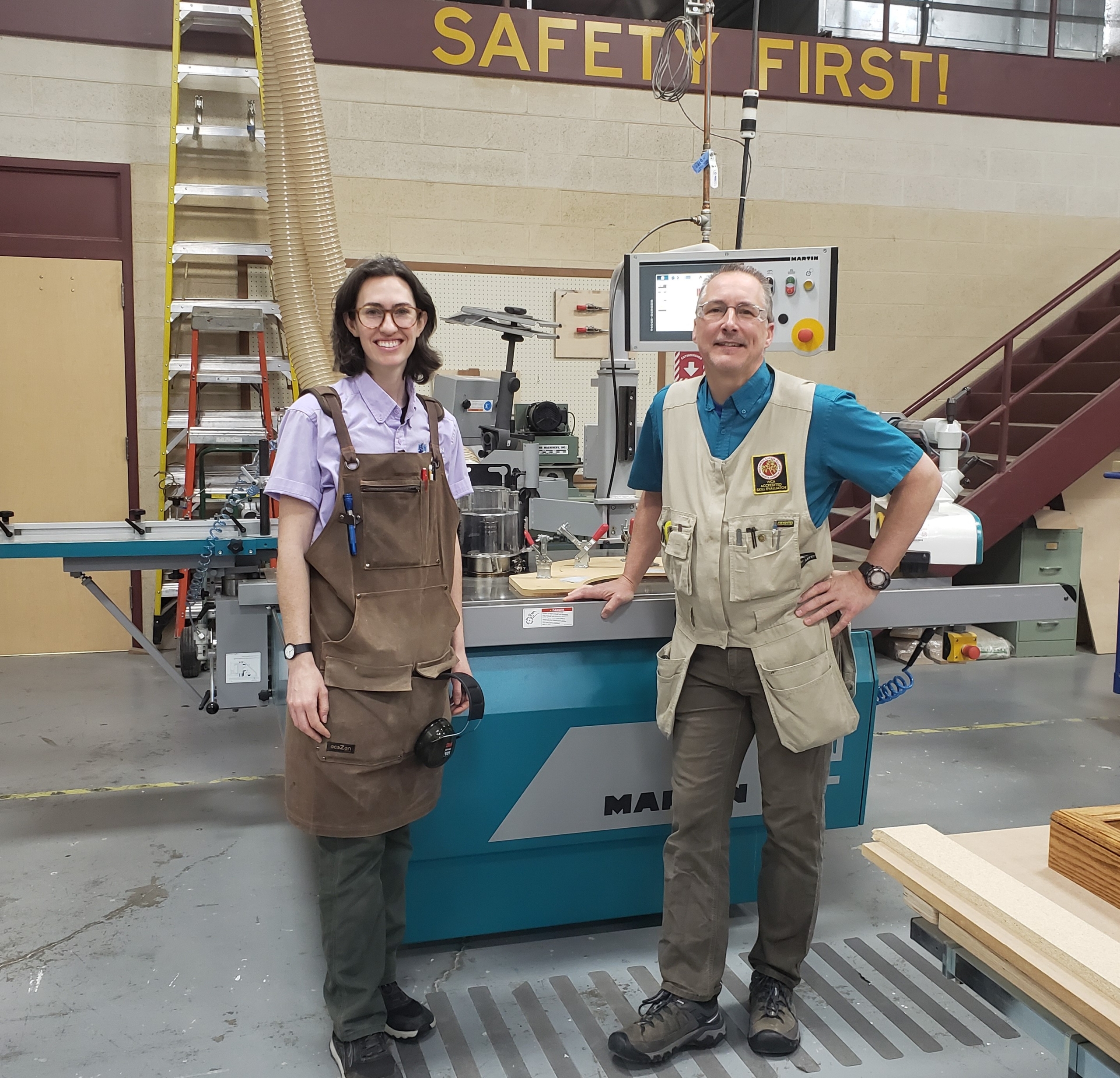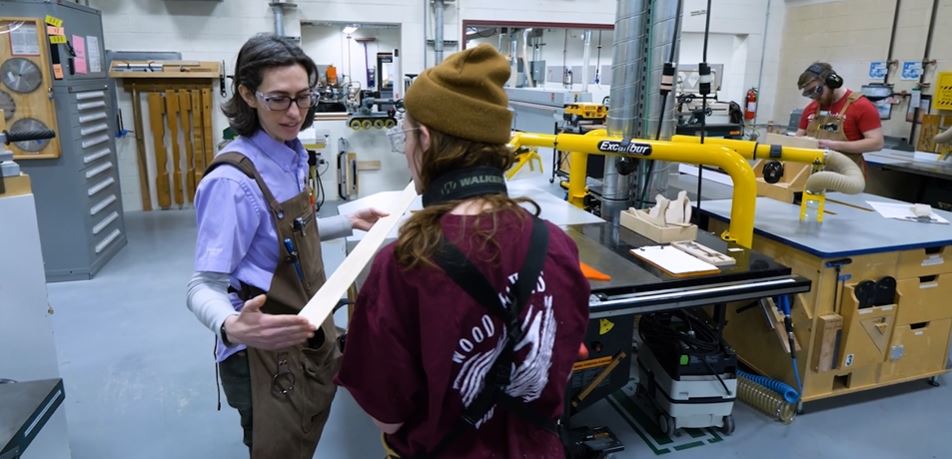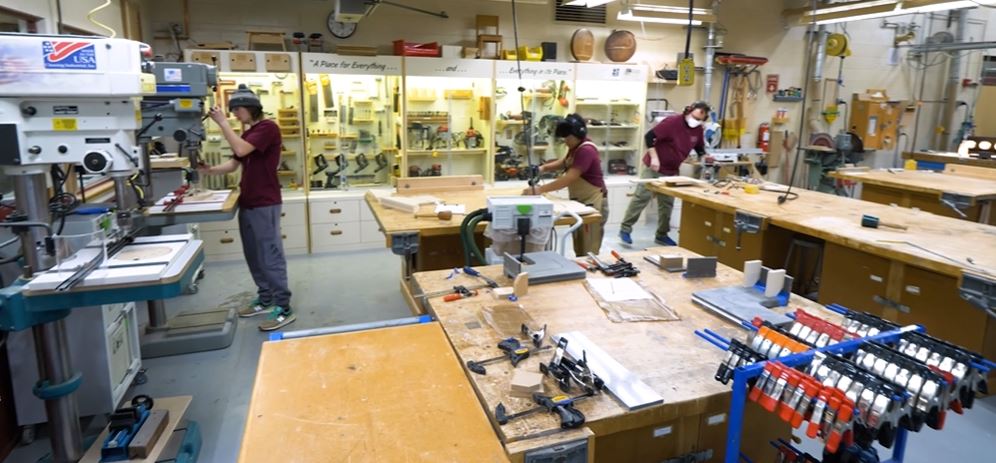Passing the Sawblade at Madison College

Lizzy Conley, new director of Madison College’s Cabinetmaking and Millwork program, poses with Patrick Molzahn, her mentor and predecesor.
After building Madison College’s Cabinetmaking & Millwork program into one of the most prestigious in the nation over the past two decades, Patrick Molzahn has stepped down and handed over the reins to one of his former “star” students.
Lizzy Conley, who graduated with a technical diploma from Madison College in 2018, officially became program director this January. Molzahn has continued to work with Conley through a well-planned 2-1/2-year transition pending his retirement at the end of this year.
Conley was one of 10 applicants interviewed to succeed Molzahn.
“I was one of a team of five involved in making the final decision,” Molzahn says. “We had a rigorous interview process, but Lizzy rose to the top. Even though Lizzy has less experience in production and manufacturing, she is a very good craftsperson. She also has excellent communication, organization and other skills that transfer into the role of program director. She brings a fresh view to the program. I think as a woman, she has the ability to outreach and encourage more women to come into the trades.”
“If you had asked me even three years ago if I thought that this is where my life would be, I would have said. ‘No way.’ It wasn’t on my radar.” Conley says. “The fact that I had the opportunity to be a student in this program and that Patrick ever since has been such a solid mentor is what made this possible. I just feel so fortunate to be able to build off a program that has such great bones. I’m so excited for where I am and for where the future will take me.”
Conley’s Woodworking Odyssey
Conley describes her ascent to program director of Madison College’s Cabinetmaking and Millwork program as a “journey filled with twists and turns.”
She attended the University of Wisconsin where she earned a degree in African languages and literature along with a minor in environmental studies. After graduating, she accepted an environmental development job in Tanzania.
“They speak Swahili in Tanzania, which is the language I had been studying.” Conley says. “I lived there for 14 months and learned a lot, but it wasn’t what I thought it was going to be. I decided I could be of much more use in my own community.”
Upon returning to Madison, Conley says she struggled to find a job in the “highly competitive non-profit world” that met her expectations. “There were a lot of qualified individuals looking for similar jobs. I was kind of floundering around a bit taking odds jobs here and there. I actually ended up on a vegetable farm. That’s where I learned I needed a vocation that was hands on. That was kind of the beginning to my ascension to woodworking.”
Conley had worked on the farm for a couple of years when her mother mentioned watching a TV show about furniture making. “She told me, ‘I think you could do that;” Conley says, adding, “She takes all of the credit for my career path as she rightly could and should.”
When Conley researched opportunities to learn woodworking, she said she was “pleasantly surprised that such a high-ranking institution was right in my backyard. I had no idea about Madison College’s Cabinetmaking program. It seemed like a no-brainer for me to join the program. I spent a year there and fell in love with woodworking. The rest is history.”
After earning her diploma, Conley first went to work for a kitchen cabinet manufacturing start-up followed by a job with a custom furniture shop. “Then Patrick pulled me back in to be his part-time lab coordinator and I slowly made my way to teaching.”
Conley cannot say enough about the positive influence Molzahn has had on her career. “Even after I graduated and went off into industry we kept in touch. That was such a pivotal part of getting me to where I am now because he takes that extra step for his students. We’re not just numbers on a list with Patrick; we’re people. His mentorship has been invaluable. The fact that I ultimately had the opportunity to take over what he has created is really just incredible.”
WCA Credentialing: Practicing What You Teach
Madison College students are trained using advanced woodworking equipment. The 13,500-square-foot woodworking lab features a CNC machining center, edgebander, and a rough mill.
In addition, Madison College was an early adopter of incorporating the woodworking Skill Standards and Passport credentialing program administered by the Woodwork Career Alliance of North America. The college’s one-year program allows students the chance to earn their Sawblade Certificate and Green Credential.
Molzahn is intimately familiar with inner workings of the WCA programs. He was a founding member of the WCA Board of Directors and took an active hand in developing the WCA skill standards and Passport credentials. In 2018, Molzahn became the first person to earn the Diamond credential, the highest honor bestowed by the WCA.
 Conley is busily aspiring to duplicate Molzahn’s achievement. Having already completed all requirements for her Sawblade Certificate, and Green, Blue, Red, and Gold Credentials, she is close to achieving her Diamond pin.
Conley is busily aspiring to duplicate Molzahn’s achievement. Having already completed all requirements for her Sawblade Certificate, and Green, Blue, Red, and Gold Credentials, she is close to achieving her Diamond pin.
“Credentialing is an important thing for anyone who wants to be a leader in their industry,” Conley says. “It has been validating for me personally to go through these steps, especially considering that I’ve only been a woodworker for five or six years. The WCA’s credentialing system has allowed me to set my sights on achievements for building my own skills and backs up my woodworking abilities when communicating my skill levels to others. I think it’s a really good system to help our students transition from the educational environment to the industry where they can to continue to build on those skills throughout their careers.”
Molzahn notes, “While Lizzy says that being a woodworker for five years is a short time, I recall Greg Heuer telling me when we were developing the WCA Skill Standards that mastery in most professions requires about 10,000 hours, which translates to five years of experience. I think it’s kind of appropriate that Lizzy is approaching Diamond this early in her career, not that she won’t continue to grow her skills; she will. One of the exciting things about our craft is that you learn new things every day. It keeps you fresh.”
Completing the Transition
While Molzahn looks forward to an active retirement full of travel and woodworking, Conley plans to do her best to push Madison College’s Cabinet and Millwork program forward to meet industry’s needs for a skilled workforce.

“In January I’ll be going to Antarctica and South America,” Molzahn says. “I’m also looking forward to learning new languages and working on projects that I haven’t been able to do for years. I’m still passionate about my craft and am on the board of the directors of the Seth Peterson Cottage, which is the first Frank Lloyd Wright property that allowed overnight guests.
“I intend to sponsor a student for the Madison College program,’ Molzahn adds. “That will give me an excuse to come out a couple of times a year to see her and check up on the program.”
Conley says her first and foremost goal is to maintain the high-quality of curriculum and instruction that Molzahn created, while keeping the woodworking lab’s technology on the cutting edge and introducing ideas and concepts to grow the program.
“One of the things we are looking into is how to add more flexible scheduling into the program,” Conley says. “We have a lot of students who want to join the program but they also need to have a job or maybe they are a little later in life and have families to care for. One of my challenges is figuring out how we can make full-time, one-year program more accessible to get more students through the door while still making sure they are successful when they leave.”
She also has her sights on potentially adding finished carpentry and cabinet installation projects to the curriculum. “I’m just trying to think about what the industry’s needs are and making a few tweaks to meet those needs going into the future,” she says.
On another front, Conley says she plans to continue the important industry partnerships that she has inherited. She says she looks forward to attending the AWFS Fair in Las Vegas this July to network with machinery and supply representatives, as well as woodworkers attending the show.
“I wanted this transition to be successful, which is why it’s been more than two years in the making,” Molzahn says. “I haven’t spent 23 years building this nationally recognized program to see it disappear. I am confident that things will move forward and grow. I see it every day that Lizzy has brought in new ideas and new energy. and I see her continuing the systems I have established but also improving them, which makes me very proud. I’m looking forward to coming back and seeing the improvements she has made to grow the program.”
Learn more about the Madison College Cabinetmaking and Millwork Program.


Leave a Reply
Want to join the discussion?Feel free to contribute!